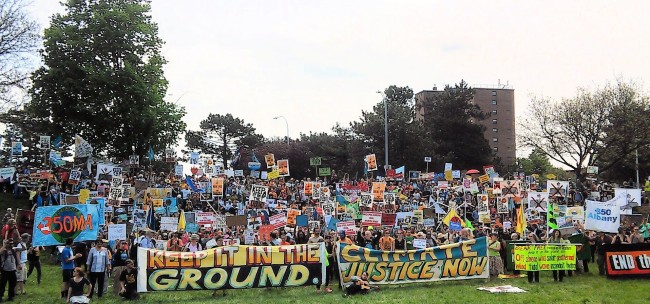I freely admit that my number one goal at the bomb train protest march in Albany, New York yesterday was to avoid arrest. I’m a lawyer and a judge here in New York State and an arrest would complicate my life, to put it politely.
Hundreds of people people did put themselves in jeopardy of arrest yesterday. Before the march, there was a lot of talk in the crowd of 2000 about who was arrestable. Basically, if your life could withstand an arrest (and possible conviction) at this point in time, you were arrestable. One MIT student said he wasn’t arrestable because he wanted to graduate this coming week. If you were willing to take the risk of arrest and conviction, you registered with the event’s legal team so they could handle your case.
It was a day of irony for me as the lawyer protagonist’s main goal in my upcoming thriller, The Killdeer Connection, is to avoid arrest too. He is suspected of killing a highly regarded scientist on the oil industry payroll. (There’s a special offer to get the first chapter of the book for free at the bottom of this page).
The goal of the protesters yesterday was to occupy the train tracks to the Port of Albany and to potentially block oil trains from making their shipments to raise awareness about the issue. Some spent the afternoon blocking the tracks. A hardier buch spent last night blocking them. I understand that as of now, five protesters have been arrested for blocking train traffic outside of Albany. (I should add that that the Albany police did an incredible job yesterday in managing the march and protest while I was there).
Anytime someone is willing to submit to arrest for something they believe in, I sit up and take notice. We all should and, in doing so, we should consider their point of view.
Here’s my attempt at providing a simple outline of what is at risk with the bomb trains:
Question: What’s a bomb train?
It’s a train with about one hundred tanker cars full of Bakken Crude, an oil product from North Dakota.
What’s the big deal with them?
Bakken Crude contains an explosive mixture of gases. Moreover, the crude is mainly being transported in tanker cars designed to carry corn syrup. A simple derailment can cause an entire train to blow up. We have had several explosions here in the United States and one in Canada that killed forty-seven people.
If you recall the World Trade Center explosion, both planes had about 30,000 gallons of fuel, about the equivalent of one tanker car full of Bakken Crude. So multiply that by one hundred to appreciate the explosive power behind an entire train. Then there are environmental risks associated with bomb trains in the case of derailments as wells. Rails historically travel alongside rivers and waterways and so a spill can be catastrophic and rails aren’t in the best shape to withstand the increased traffic.
According to the Association of American Railways, 9,500 carloads of crude oil were shipped by rails in 2008. By 2014, 493,146 carloads were shipped–an increase of nearly 5,100 percent. In a sense, our railroads have been converted into a pipeline of sorts.
Albany is said to receive about 25 percent of all Bakken Crude shipped.
Who is impacted?
Anyone who is lives or works near a rails where they haul this oil. That’s most likely going to be low income and minorities who typically live close to the train tracks. But the risk is far greater than that. You’d be surprised how many tracks ship oil and how close they come to highly populated areas. They may be closer than you think. Click here for an interactive map to show how extensive oil traffic is on the rails in the United States.
What can be done?
Local firefighters are arming themselves with foam equipment but they are really helpless when these trains explode. The protocol is to stay away and evacuate when a bomb train blows.
There are some who believe all fossil fuels should just be left in the ground. That’s a larger topic. But there is an immediate means of addressing one safety hazard with these trains: remove the explosive gases from the oil before it’s shipped from North Dakota. This process is called stabilization. This process needs to be distinguished from conditioning which does not do the job. This oil is stabilized before it’s put into pipelines and before it’s shipped via boats. Why not rails? Good question.
Why aren’t the oil companies stabilizing the oil?
They are not required to do it and to do so would cost money.
What’s the result?
There are a large number of Americans whose lives are unnecessarily put at risk every day for the benefit of the oil companies.
I’ve been researching fracking and bomb trains as part of my upcoming legal thriller novel, The Killdeer Connection, for over six months now. One of the goals of the novel is to raise awareness of the bomb train and fracking issues in an informative yet entertaining way.
Tom Swyers is an attorney, judge, and the award-winning author of Saving Babe Ruth, the prequel to the David Thomson Lawyer Series. His upcoming legal thriller, The Killdeer Connection, is the first book in the David Thompson Lawyer Series. It’s about a lawyer who must battle the fracking industry before it kills him and his family. Sign up to join my readers group to keep up to date by clicking this link here .

